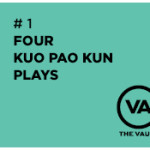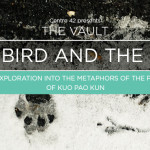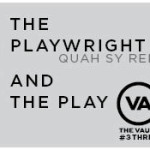“Life has been exceedingly kind and generous to me.”Source: Foreward by Kuo Pao Kun. In Images at the Margins: A Collection of Kuo Pao Kun’s Plays (p.8).
The timeline below presents selected events from Kuo Pao Kun’s life. Click on each tab to find out what happened during the year.
This timeline is not meant to be a complete record of Kuo Pao Kun’s life — for more information, please consult the additional sources listed below.
- 1939
-
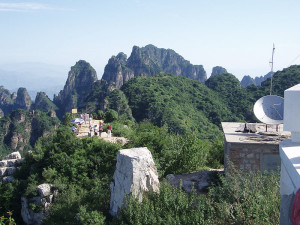
Heibei Province, China. (Source: Wikipedia)
- Born in Hebei Province, China.
- 1947
-
- Moved to Beijing, China.
- 1949
-
- Moved to Hong Kong, then to Singapore.
- Enrolled in Catholic High School, Primary Section.
- 1955
-
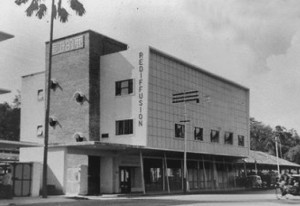
Rediffusion Singapore building. (Source: rediffusion.info)
- Joined Rediffusion’s Mandarin Drama Group as a broadcaster, writing and performing radio dramas and comedies.
- Transferred to Chung Cheng High School (Kim Yam Road Branch).
- 1956
-
- Transferred to Kallang West Government Chinese Middle School (now Dunman High) because of student strikes at Chung Cheng High School.
- 1957
-
- Sent to Hong Kong to avoid political unrest among the Singapore Chinese students.
- Returned to Singapore and attended Pasir Panjang Secondary School.
- Met his future wife Goh Lay Kuan.
- Attended a screen-acting workshop by Cathay Eris Studios.
- 1959
-
- Moved to Melbourne and worked as a Chinese translator and announcer for Radio Australia.
- 1963
-
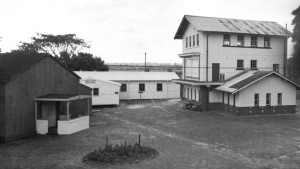
The Old Tote theatre building which formerly housed NIDA. (Source: UNSW Village)
- Enrolled in drama programme at the National Institute of Dramatic Art (NIDA).
- 1964
-
- Worked several jobs in technical theatre around Melbourne.
- Proposed to Goh Lay Kuan.
- Graduated from NIDA with a Diploma in Production.
- 1965
-
- Returned to Singapore.
“I was born in a poor village in Hebei and was taken to classical Peiping, then to cosmopolitan Hong Kong, then to multicultural Singapore, then to the massive Down Under, then back to Singapore, and for good. The different places have been enriching, the people inspiring, the diverse cultures exhilarating. But it was at the margins of all these individually brilliant experiences that I found the most enlightening of spaces and moments. They were so singularly beautiful that one had to invent vocabularies to describe them, these uncharted territories, unexperienced happenings, unfathomed depths, these images at the margins.”Source: Foreward by Kuo Pao Kun. In Images at the Margins: A Collection of Kuo Pao Kun’s Plays (p.8).
“All these [early] works have such a deeply set brand of times that one could almost sense the strong feel of the period just by reading the titles. It was an exceptional phase in Singapore’s history. The struggle between the different political forced produced social unrest. The departure of the British forces and foreign investment led to an economic slump that made life very difficult for the working class. Ideologically, it stimulated the radical young people. The Cultural Revolution in China, which began in 1966, spilled over into Singapore in the 1970s, a country with an ethnic Chinese majority. Many arts enthusiasts were deeply affected by the trend of thought of the Cultural Revolution, view art, literature and drama as weapons of struggle and tools of social change.”
Source: The Soil of Life and the Tree of Art: A Study of Kuo Pao Kuns’ cultural individuality through his playwriting by Yu Yun, translated by Kuo Jian Hong. In Images at the Margins: A collection of Kuo Pao Kun’s Plays (p.21).
- 1965 (cont’d)
-
- Married Goh Lay Kuan.
- Co-founded the Singapore Performing Arts School (later renamed Practice Performing Arts School) with Goh Lay Kuan.
- 1966
-
- Translated and directed Bertoli Brecht’s The Caucasian Chalk Circle. (It is the first Brecht play to be staged in Singapore.)
- 1967
-
- First daughter, Koh Jian Hong, born.
- 1968
-
- Wrote and directed first full-length Chinese play Hey, Wake Up!
- 1969
-
- Wrote The Struggle – performance banned.
- 1970
-
- Wrote Evergreen – performance banned.
- 1971
-
- Wrote The Sparks of Youth and dance-drama Story of the Old Stonemason – both performances banned.
- Returned to NIDA in Melbourne for the Advanced Course in Dramatic Art; returned to Singapore within the year.
- Second daughter, Koh Jing Hong, born.
- 1976
-
- Detained without trial under the Internal Security Act.
- 1977
-
- Citizenship revoked.
- 1980
-
- Released from prison.
- 1984
-
- Wrote first English play The Coffin Is Too Big for the Hole.
- 1985
- 1986
-
- Wrote and directed No Parking on Odd Days.
- The Coffin Is Too Big for the Hole is performed in Malaysia. (More details in The Repository.)
- Wrote and directed No Parking on Odd Days.
- 1988
-
- Devised and directed Mama Looking for Her Cat, Singapore’s first multilingual play. (More details in The Repository.)
- Wrote Day I Met the Prince.
- Co-founded Practice Performing Arts Centre Ltd.
- Translated Kapai Kapai from Malay to Chinese. (More details in The Repository.)
- 1989
-
- Wrote and directed the English version of The Silly Little Girl and the Funny Old Tree. (More detail in The Repository.)
- Organised the International Brecht Seminar with the Goethe Insitut.
- Received the Cultural Medallion from the Singapore government.
- 1990
-
- Wrote and directed The Eagle and the Cat.
- Wrote and directed Lao Jiu.
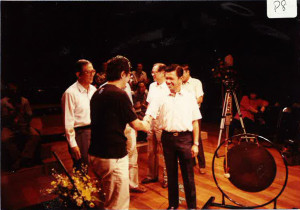
The Substation opening ceremony, 16 September 1990. (Source/more images available at: The Substation Archive Project)
- Founded The Substation, Singapore’s first arts centre.
- Received the ASEAN Cultural Award.
- Wrote and directed The Eagle and the Cat.
“The prison years were unkind to him; in addition to mental pressures he also had to endure physical hardships, which he hardly spoke of publicly. However, a particular philosophical attitude towards life not only saw him through the experience but also led him to take on newer creative challenges – without the debilitating sense of bitterness and animosity that would understandably distort the personality of many a person emerging from such an ordeal.”Source: Remembering Kuo Pao Kun (1939-2002) by Kwow Kian-Woon. In Inter-Asia Cultural Studies, Vol. 4(2), 2003.
“In order to get his actors to shed their personas and then to get them to the point when they would willingly bare their innermost selves to public scrutiny, Kuo Pao Kun had taken his cast [from 0Zero01] through a number of demanding exercises. For example, to wrench his actors from their dependence on creature comforts, their need for company and their reliance on the safety of a social system, Kuo brought them to a secondary forest bordering a sand quarry. In the deep of the night, just before midnight, the actors were asked to spread out. Each entered the forest to spend the night alone through to eight in the morning.”Source: Kuo Pao Kun: The Spirit of the Eagle by Margaret Chan. In Contemporary Theatre Review, Vol. 13(3), 2003.
- 1991
-
- Devised and directed OZeroO1.
- 1992
-
- Wrote and directed The Evening Climb. (More details in The Repository.)
- Appointed advisor to the National Arts Council.
- Advised the development of Theatre Studies courses at National University of Singapore and Nanyang Technological University.
- Singapore citizenship reinstated.
- 1993
-
- Wrote the English version of Lao Jiu for TheatreWorks.
- 1994
-
- Adapted and directed Fishing Eagles by Chen Zhihua (Hong Kong) (More details in The Repository.)
- 1995
-
- Wrote Descendants of the Eunuch Admiral:
- English version by TheatreWorks premiered at the Festival of Asian Performing Arts.
- Directed the Chinese version by Practice Theatre Ensemble, premiered a few months after the TheatreWorks production. (More details in The Repository.)
- China Tour cancelled due to disapproval from the Chinese authorities.
- Resigned from The Substation as its Artistic Director.
- Wrote the English version of The Eagle and the Cat.
- Wrote The Evening Climb.
- Wrote Descendants of the Eunuch Admiral:
- 1996
-
Adapts and directs The Savage land. (More details in The Repository.)
Received the Chevalier des Arts et des Lettres from the French government.
- 1997
-
- Directed Mother Daughter Eagle Cat, an English double-bill of The Eagle and the Cat and Zhu Cai Zhen’s My Mother’s Chest. (More details in The Repository.)
- Wrote Geylang People in the Net. (More details in The Repository.)
- 1998
-
- Wrote The Spirits Play.
- Directed by Stan Lai (More details in The Repository.)
- Directed a re-written version at the Chinese Theatre Festival, Hong Kong.
- Wrote The Spirits Play.
- 1999
-
- Wrote and directed Sunset Rise. (More details in The Repository.)
- 2000
-
- Co-founded the Theatre Training & Research Programme (now the Intercultural Theatre Institute).
- 2001
-
- Co-wrote One Hundred Years in Waiting. (More details in The Repository.)
- 2002
-
- Awarded the Excellence for Singapore Award.
- Passed away from kidney cancer.
For those unfamiliar with Kuo Pao Kun’s works, one may be taken aback with the bare stage and zero props. The focus here is on the actor and so the actor carries the weight of the script upon his voice, movement and every subtle expression… Kuo’s poetic voice emerges with an evocative simplicity as the protagonist recalls his childhood of squatting in caves of his poor village. He remembers fondly how he used to watch the eagle spread out its wings and glide towards the sun., how the sky offered freedom and space.Source: Simply Good Theatre by Sherrie Lee. In The Flying Inkpot (1 May 1997)., http://tinyurl.com/q2t58md
^Back to top
Additional Sources:
- Images at the Margins: A collection of Kuo Pao Kun’s Plays. (2000). Singapore: Times Media.
- Two Play by Kuo Pao Kun. (2003). Singapore: SNP Editions.
- Tribute.sg – Kuo Pao Kun
- The Theatre Practice – Milestones
By Daniel Teo
Published on 8 October 2015
The Vault: Dialects and Dialectics revisits two monologues by the late local theatre doyen Kuo Pao Kun: No Parking On Odd Days and The Coffin Is Too Big For The Hole. Nine Years Theatre’s artistic director Nelson Chia explores the cultural sentiments and grassroots sensibilities of these plays by staging them in Cantonese and Teochew respectively. Find out more here.
The Vault: Big Bird and the Cat revisits Kuo Pao Kun’s plays in Margaret Chan’s exploration into the metaphors of Big Bird and the Cat, on 12 October 2015, 8pm at Centre 42 Black Box. Admission is free. Find out more here.



